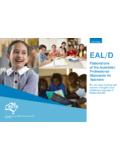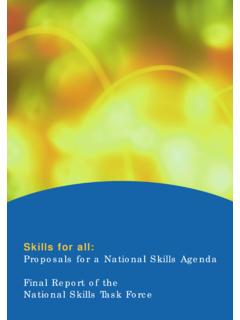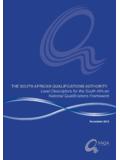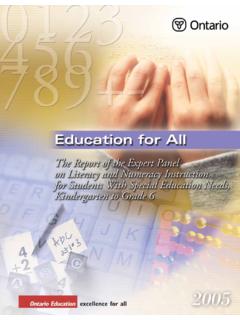Transcription of ACTANational Foundation Skills Response 060520111
1 1 1. What are Foundation Skills ? The NFSS Consultation Paper states that there is no generally accepted definition of Foundation Skills and that the FS Working Group has agreed to use the OECD definition Language, literacy and numeracy in combination with employability Skills in the information age (page 4). This definition is a useful starting point for discussion about the education needs of different groups of adult Australians. It accords with the statement in the Industry Skills Council s paper No More Excuses (April 2011) that language, literacy and numeracy are the essential underpinning Skills for enabling people to participate in work, learning and society.
2 Language, literacy and numeracy Skills have been variously described in policy and programs for adults. However, so called language Skills are generally poorly understood in policy papers and policy development. Earlier policy documents ( , national Policy on Languages, Lo Bianco, 1987, and Australia s Language, DEET, 1991) have made the distinction between language and literacy. The Consultation Paper states that language is the ability to understand and speak the English language and that literacy is the ability to read and write . However, this definition focuses on the end points (or outcomes) for learning.
3 It contains the danger of assuming that learners of English as an additional language or dialect (EAL/D) will have the same learning needs as English native speakers who are developing basic literacy Skills . Learning needs derive from learners starting points and the pathways they traverse towards desired end points. Learners starting points vary enormously and hence also their learning pathways. Assuming that learning needs are uniform will produce one size fits all programs and approaches that fail to target learners starting points for learning or build on what they know.
4 A national strategy directed to improving the Foundation Skills of working age Australians must address learning needs, and should not make the simplistic assumption that pathways towards desired outcomes are uniform. A truly national strategy for developing Foundation Skills must start with a conceptual framework that is inclusive of adult learners diverse starting points and pathways. It needs to provide a basis and justification for different programs and approaches that can address learner needs, while also allowing for the flexibility to combine programs and approaches where needs overlap and come together.
5 2 2. What should be the focus of the national strategy? The focus of the national strategy must be provision for the diverse starting points from which adult learners can develop Foundation Skills , and building appropriate and coherent pathways towards acquiring these Skills . The Consultation Paper homogenises and over simplifies both English language learning needs and literacy learning needs. If policy definitions fail to acknowledge these starting points and pathways, the programs that follow are liable to miss their mark. The national strategy must accommodate the basic distinction between adult learners who speak English as their only language and mother tongue and who lack literacy Skills , and those for whom other languages are their primary or dominant means of communication and who are learning English as a second/additional language or dialect.
6 Those who have grown up speaking English (the first group) have been socialised and had their education (however much or little) in English. The need for assistance in acquiring basic literacy will relate to many factors but their starting points and pathways into literacy will have in common a Foundation in spoken English (for example, an ability to distinguish sounds in English, a command of English words and sentence patterns, etc.) and an understanding of local cultural meanings and the Australian context. Literacy programs must build from this starting point and use it to underpin teaching.
7 Beginning English language learners (the second group) who are adult migrants need to learn to distinguish English sounds, develop an English vocabulary and a command of English sentence patterns, and learn about Australia. Some may have advanced literacy Skills in their other language(s), while others may have had little/no previous formal schooling. Some of these learners may be highly skilled in acquiring knowledge in an orally based culture. Learning literacy in English may require programs that build on a good education and a full understanding of literacy in other languages but that cannot assume any competence in spoken English or knowledge of the local Australian context.
8 Quite differently, other learners will require programs that also must build a Foundation in spoken English but at the same time provide very basic real world and school knowledge. Indigenous speakers of English as an additional language, including those who speak Aboriginal creoles, may be similar to this group in significant ways but differ in others. Speakers of Aboriginal Englishes will be similar in some ways but quite different in others, as will also some adults from the Pacific Islands. A national strategy should promote programs that build on diverse Skills and levels of skill, whether for existing workers moving to higher positions, unemployed workers requiring training prior to participation in the workforce, or parents/guardians supporting their children in school education.
9 It should take into account that learning needs will vary, and may include a combination of many Skills or a focus on one or two Skills . For example, as just indicated, some recently arrived adult migrants or refugees may need to focus on spoken English and local knowledge in order to access occupations for which they are already 3 qualified or in which they have considerable experience, but may already have advanced literacy Skills (even in English), while others will need a long term and comprehensive approach to both English and basic education.
10 The Industry Skills Councils paper No More Excuses correctly states that English language and literacy Skills are an ongoing and integral part of workforce development. They should not be targeted simply at lower skill levels. Development of high level spoken English and English literacy Skills are also important, for example, for skilled and well qualified migrant workers. At the same time as recognising and providing for different starting points for learning, a crucial aspect of a national Foundation Skills strategy must be to overcome existing blockages in learning pathways and to develop substantive linkages that allow learners to move between programs along a coherent track towards mainstream vocational training or higher education.











